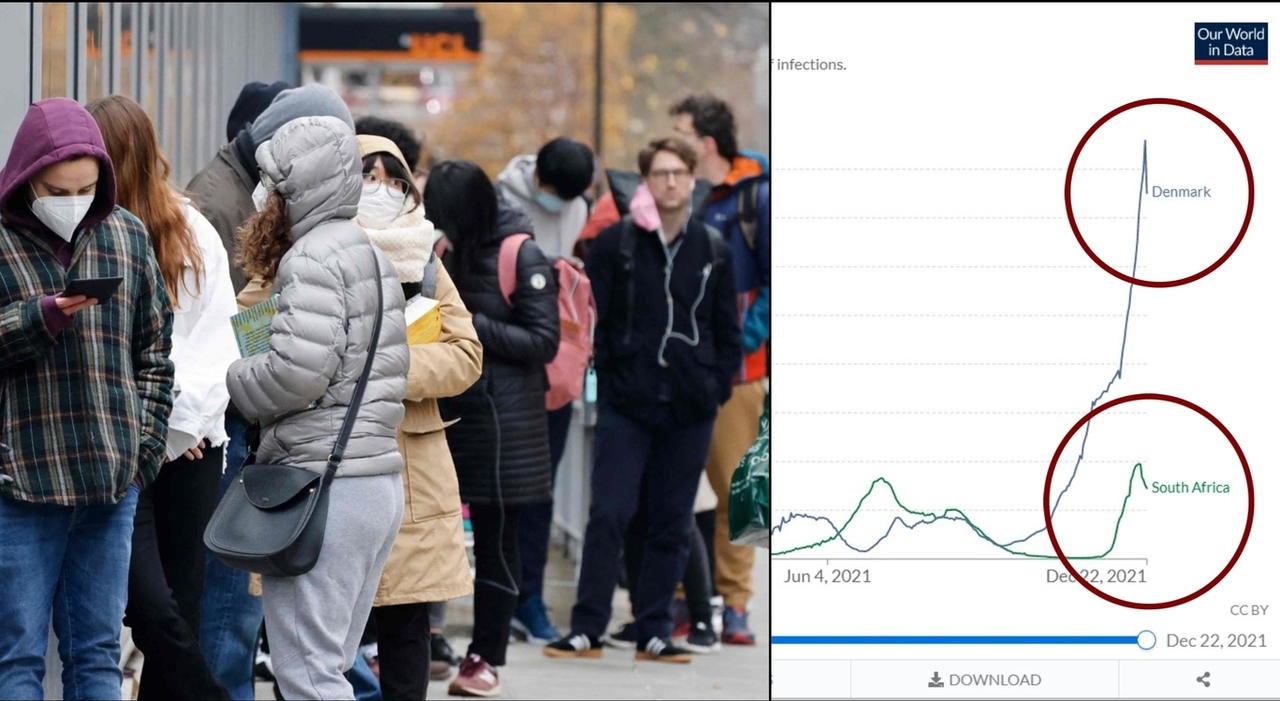The scientific community observing data from different countries around the world discusses how severe the disease caused by the Omicron variant is. Milder? Same as Delta but limited by vaccine protection? Does it affect the bronchi more than the lungs? There are still no certainties in this regard. But there is no doubt about a characteristic presented by the new Covid strain: Omicron travels at a very high infectious speed and the numbers confirm this with cases that grow exponentially wherever it appeared.
Omicron, the (short) incubation times
Among the reasons for this very rapid contagiousness could be the incubation times, shorter than the previous variants dealt with so far, from the original SarsCov2 strain up to Alpha and Delta. The World Health Organization has estimated that the onset of symptoms would take two days to two weeks to manifest in cases of people infected with the first strain of coronavirus. Time that has shortened with the Delta variant and that is proving even shorter with Omicron which is identified from three to five days.
A hypothesis also confirmed by recent analyzes by the United Kingdom Health Security Agency. This would explain why Omicron spread so quickly and successfully, as the shorter incubation period gives sufferers a shorter window between suspicion of having contracted the virus and symptoms, making it less likely that a positive test result will be recorded. in time to feel the close contacts, put yourself in isolation and prevent the transmission of the infection. A shorter incubation period “makes a virus much more difficult to control,” Jennifer Nuzzo, an epidemiologist at the Johns Hopkins Center for Health Security, told The Atlantic.
Omicron and symptoms other than Delta
Another aspect that potentially makes Omicron more difficult to detect than other strains is the characteristic of its symptoms. No more cough, fever and loss of sense of taste or smell. The first warning signs for the new variant, on the other hand, include sore throat, back pain, runny or blocked nose, headache, muscle aches and fatigue, sneezing and night sweats. Current evidence from Omicron cases analyzed in the UK shows that patients are able to heal in an average of five to seven days, although some of the symptoms such as cough and fatigue may persist for longer. In severe cases, shortness of breath has also been reported, which was observed to last up to 13 days later.
Lower hospitalizations than Delta: two studies
Two studies, conducted in England and Scotland respectively, found a lower level of hospitalization for covid cases with the Omicron variant than those triggered by the Delta variant. This was reported by Sky News among others. Research in the UK notes that people infected with the Omicron variant have between 15% and 20% less chance of hospitalization than those infected with the Delta variant. In particular, the study carried out by Imperial College in London underlines that among people infected with Omicron they are 40-45% less likely to spend a night or more in hospital than those infected with Delta. Furthermore, those who have already been infected previously have a 50-60% less chance of hospitalization than those who have not been previously infected. On the other hand, the Scottish study argues that Omicron is associated with a two-thirds reduction in hospitalization risk compared to Delta.
The peak and the descent: the South Africa case
After the very rapid surge in cases of the Omicron variant in South Africa, the number of new infections is now falling and is down 20 percent, compared to last week. This is what South African researchers report, interviewed by various international media, including the New York Times. According to epidemiologist Michelle Groome, of the National Institute of Communicable Diseases, in the epicenter of the latest wave experienced by the country, the province of Gauteng, where Johannesburg and the capital Pretoria are located, the peak seems to have been reached last week. “It is encouraging – said the scientist – in terms of decreasing trends and number of cases”. Studies based on the earliest recorded cases in Gauteng province also seem to suggest that Covid-19 cases caused by the Omicron variant tend to be less severe than those associated with earlier variants. And yet, experts note, in the province of Guateng there is a higher percentage of vaccinated than in the rest of the country and this could have mitigated the action of the virus.
Less severe symptoms
“In South Africa, Omicron, according to our data, exhibits reduced severity compared to other variants.” This was stated by Cheryl Cohen of the National Institute for Communicable Diseases (NICD), one of the authors of the study on the impact of the new variant, during a press conference. However, the South African experts – reports the Guardian – underlined that the reasons for which less serious cases were observed “have not been fully understood and that the experience of South Africa, with a young population, may not translate into the way in which other countries experience Omicron ». “The lower risk or lower proportions of serious illness we are seeing in the fourth wave could be due to a number of factors, including the previous immunity level of people who have already been vaccinated or have had a natural infection, or it could also be due to Omicron’s inherent virulence, ”said Waasila Jassat of the NICD. “We need more studies to be able to understand it,” he added.
© breaking latest news
.
